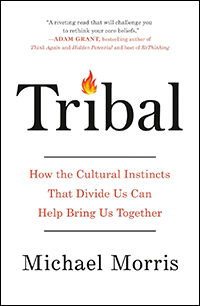Book review - Tribal: how cultural instincts that divide us can bring us together
Denise Winn reviews 'Tribal: how cultural instincts that divide us can bring us together' by Michael Morris (Swift Press, 2025) £22.00 (paperback, £12.99 to be published on 9 Oct 2025)
We often talk almost reverently of respecting cultural differences, as if they are set in stone. But, says cultural psychologist Michael Morris from Columbia University, culture is far from immutable; it is our outdated approaches to studying them that have reduced them to “stable patterns – age-old institutions or fixed character traits”. As he argues in this instructive book, it is not collective institutions or individual psychologies that determine culture but the interplay between them; and that can be “not just malleable [but] labile and sometimes downright volatile”. When the circumstances are right, and Morris explains exactly what these are, new social patterns can rip through a society, with an unforeseen and often alarming ripple effect. Understanding what really drives culture, and how, enables us to contemplate new means of creating positive connections.

Morris has been in the vanguard of the new science called cultural psychology (a fusion of anthropology and psychology), in which proponents study cultures ranging from hunter-gatherers to corporations and countries to find out how and why cultural beliefs and behaviours become embedded, shift dramatically or never catch on at all. The answer, Morris shows us, involves a judicious mix of prevalence, prestige and precedent. It is these determining phenomena, in the form of tribal instincts dating back to the Stone Age, that Morris goes on to unpack vividly throughout the book.
These instincts, which fostered our ability to cooperate within groups for better survival, are still recognisable drivers of our behaviour today: “Our sideways glances at classmates, coworkers and neighbours are part of the peer instinct, as is our impulse to mesh with their patterns in our everyday inferences and actions. Our upward-directed fascination with celebrities, CEOs and other elites comes from the hero instinct, as do our aspirations for glory and our drive to contribute. Our backward-gazing nostalgia is part of the ancestral instinct, as is the comfort we find in traditions and the duty we feel to maintain them. These instincts are like three characters inside every person: the conformist who seeks belonging and understanding, the contributor who dreams of esteem and tribute, and the traditionalist who cherishes continuity. Each of these systems has its fallibilities but each generally guides people in adaptive directions,” says Morris. “Tribal living,” argues Morris, “is what made us truly human”.
He proceeds to “peel the onion” of our tribal instincts, starting with peer instinct. He shows, for instance, that it is language that ‘cues’ cultural expression – as aptly demonstrated in bilingual people’s ability not only effortlessly to switch tongues but to switch mannerisms, emotional expressiveness and even interpretations of behaviour, according to which language they are using – Morris calls it social sense making. The peer instinct is also behind our yearning for certainty because consensus is the next best thing: people feel ‘in the know’ when they follow the crowd.
The hero instinct brought another dimension to communal living, involving attunement to behaviours admired and prized within a particular community, enabling us to follow suit and earn acceptance: “Instead of just motivation to act normally, there was motivation to act normatively. Individuals looked for exemplary ways to contribute to the good of the group, even if personal sacrifice was required.” It is this, as Morris explains, that led to development of new tools and practices and widened the span of cooperation with others. The development of ‘symbols’ to identify different tribes (whether different totems for different clans or heraldic coats of arms or sports team insignias) emanates from the hero instinct – and can also lead, of course, to the perils of Us and Them.
The power of the final ingredient in the cultural stew, the ancestor instinct, is that tradition is followed blindly; rituals have to be carried out to the letter (seen even in the simple rituals children develop to feel safe, such as demanding a particular voice or set of mannerisms from the reader of a bedtime story). Faithful enactment of traditions serves to bind and create a sense of unity within a group.
Morris artfully dissects well-known instances of organisational or national attempts to change behaviours, using the three instincts to explain why they did or didn’t work. Ditto cultural appropriation. Grassroots action doesn’t always work, either, as the ill-fated Occupy Wall Street demonstration spectacularly showed. Although it led thousands of protesters to sleep in parks and attempt to practise a new form of democracy, it didn’t change culture. “It sent prevalence signals effectively but not prestige signals or precedent signals, perhaps because of its refusal to name leaders and its rejection of comparisons to previous movements”, explains Morris; whereas Gandhi successfully infused his grassroots movement to end the Raj with a sense of returning to more ancient, longstanding Indian traditions.
In the final chapter, entitled “When change spreads, and when it fizzles out”, Morris shows that blaming much major world unrest on toxic tribalism fueled by hate for out-groups “doesn’t square with evolutionary or psychological evidence”. More helpful is to try to understand conflict through the three tribal instincts “each of which can cycle out of control under certain conditions in dysfunctional ways.” But he also has hope that using the understandings from tribal psychology can help us act effectively for global good. A salutary lesson is that, while we are all likely to dismiss evidence that does not fit with our own views, such selectivity is most pronounced in those who are more highly educated. How can we break that dispiriting pattern? A good starting place would be to read this excellent book.
Latest Tweets:
Tweets by humangivensLatest News:
HG practitioner participates in global congress
HG practitioner Felicity Jaffrey, who lives and works in Egypt, received the extraordinary honour of being invited to speak at Egypt’s hugely prestigious Global Congress on Population, Health and Human Development (PHDC24) in Cairo in October.
SCoPEd - latest update
The six SCoPEd partners have published their latest update on the important work currently underway with regards to the SCoPEd framework implementation, governance and impact assessment.
Date posted: 14/02/2024











